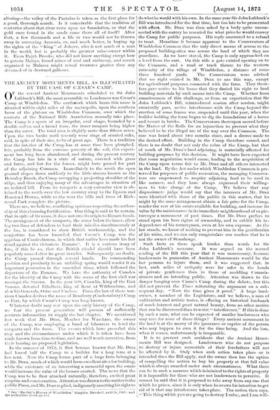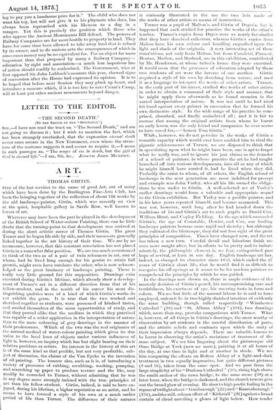THE ANCIENT MONUMENTS BILL, AS ILLUSTRATED BY THE CASE OF
Cs'ESAR'S CAMP.
OF the several Ancient Monuments scheduled to Sir John Lubbock's Bill, the most accessible to Londoners was Cfesar's Camp at Wimbledon. The earthwork which bears this name is situated within eight miles of the metropolis, upon the southern brow of the plateau on Wimbledon Common, over which the contests of the National Rifle Association annually take place. The Camp is a space of an irregular, oval shape, bounded by a double ?villein and a broad fosse, the inner rampart being higher than the outer. The total area is slightly more than fifteen acres.. Upon the two banks until recently were rings of stunted oaks; said, in spite of their size, to be of great age. There is a tradition that the interior of the Camp has at some time been ploughed, but, probably from the extreme poverty of the soil, this experi- ment has long been abandoned, and during the present century the Camp has lain in a state of nature, covered with grass and furze, and but for the fences, might have passed for part of the adjoining Common. Immediately to the north the open ground slopes down suddenly to the little stream known as the Beverley Brook, the Camp occupying a projecting shoulder of the ridge, and thus enjoying many of the advantages in situation of an isolated hill. From its ramparts a very extensive view is ob- tained to the south over the low country away to the Epsom and Banstead Downs, while to the west the hills and trees of Rich- mond Park complete the picture.
There are, we believe, conflicting opinions respecting the author- ship of this charming fortification. One thing is said to be certain, that in spite of its name, it does not owe its origin to Roman hands. The arrangement of the ramparts, the outer below the inner, allow ing two lines of defenders to hurl their missiles simultaneously at the foe, is considered to show British workmanship, and the conjecture has been hazarded that Oesar's Camp was the oppidum of Cassivelaunus, in which that native hero made his last stand against the victorious Romans*. It is a curious irony of fate, if this be so, that the British citadel should have been popularly named after its great invader. Subsequently, no doubt, the Camp passed through several bands. Its commanding position and proximity to an unfailing spring would render it an important possession in the unsettled times which followed the departure of the Romans. We have the authority of Camden for the identity of the Camp with the scene of the first civil war amongst the Saxons. In the year 568, Ceawlin, king of the East Saxons, defeated Ethelbert, king of Kent at Wibbandune, and slew his Generals, Oslac and Cneben. From the last of these war- riors Camden derives the name of Bensbury (Cnebensbury) Camp or Fort, by which Ceesar's Camp was long known.
Whatever doubt may rest upon the early history of the Camp, we fear the present generation will possess of sufficiently accurate information to supply the last chapter. We mentioned last week that Mr. Drax, Member for Wareham, the owner of the Camp, was employing a band of labourers to level the ramparts and the fosse. The events which have preceded this step and the circumstances under which it is taken have been made known from time to time, and are well worth narration, from their bearing on proposed legislation.
In the summer of 1872, it first became known that Mr. Drax bad leased half the Camp to a builder for a long term at a low rent. Now the Camp forms part of a large farm belonging to Mr. Drax, much of which would form excellent sites for building, while the existence of so interesting a memorial upon the estate would increase the value of the houses erected. The news that the Camp was to be first attacked naturally, therefore, excited great surprise and consternation. Attention was drawn to the matter in the public Press, and Mr. Drax replied, indignantly asserting his right to
• See "Bartlett's History of Wimbledon," Simpkin, masa:its and Co., 1865; and the authorities there (turned. do what he would with his own. In the same year Sir John Lubbock's Bill was introduced for the first time, but too late to be prosecuted with effect. Mr. Drax was then asked by a body quite uncon- nected with the outcry he resented for what price he would convey the Camp for public purposes. His reply amounted to a refusal to treat. Meantime it became apparent to the Conservators of Wimbledon Common that the only direct means of access to the proposed building-sites was across the land of which they are guardians. As we have stated, the Camp is only approached on a level from the east. On this side a gate existed opening on to the Common, and a road or track thence to the western extremity of the village of Wimbledon, a distance of some three hundred yards. The Conservators were advised that no right existed in Mr. Drax to use this way, except for agricultural purposes connected with the farm. They there- fore gave notice to his lessee that they denied his right to haul building materials by such means into the Camp. Whether from consciousness of this challenge, or from an expectation that Sir John Lubbock's Bill, reintroduced session after session, might eventually pass, active interference with the Camp beyond the erection of some fences was suspended until this year, when the builder holding the lease began to dig the foundations of a house and to cart in bricks. The Conservators thereupon moved before the Master of the Rolls for an injunction to prevent what they believed to be the illegal use of the way over the Common. The case was heard about two months since, and a decree made to the desired effect. Building in the Camp therefore ceased, and there is no doubt that not only the value of the Camp, but that of much of Mr. Drax's land adjoining, is materially affected for building purposes by this decision. It might have been expected that some negotiation would ensue, leading to the acquisition of the Camp upon terms fair to Mr. Drax and all others interested in the land. By the Act under which Wimbledon Common is pre- served for purposes of public recreation, the managing Conserva- tors are empowered to acquire adjoining land to be used in like manner, and they have always expressed their willing- ness to take charge of the Camp. We believe that any dispassionate judge would say that the interests of Mr. Drax were identical with those of the public in this matter, that he might by the same arrangement obtain a fair price for the Camp, render the rest of his estate available for building, and increase its value bythe maintenance in its immediate neighbourhood of so pic- turesque a monument of past times. But Mr. Drax prefers to stand upon his bare rights of -ownership, and to exhibit his in- dependence of his countrymen, even at his own expense. As the law stands, we know of nothing to prevent him in the gratification of his whim, and we can only congratulate our readers that he is not the owner of Stonehenge.
Such facts as these speak louder than words for Sir John Lubbock's measure. It was argued on the second reading of the Bill this year that it was unnecessary, because landowners in possession of Ancient Monuments would be the last persons to injure them, and it was suggested that, in fact, such relics of antiquity were far safer in the bands of private gentlemen than in those of meddling Commis- sioners and an intruding public. Attention was drawn to the danger hanging over CTsar's Camp during the debate, but this did not prevent the Times reiterating the argument on a sub- sequent day. "Now the time gives it proof." A large land- owner, a member of the Legislature, and we believe, a man of cultivation and artistic tastes, is effacing an historical landmark of much interest and great natural beauty, from no other motive that can be discovered than to resist "interference." If this is done by such a man, what can be expected of smaller landowners who may care for none of these things? Every ancient monument in the land is at the mercy of the ignorance or caprice of the person who may happen to own it for the time being. And the loss, when it comes, unfortunately is irreparable.
It is to prevent such accidents that the Ancient Monu- ments Bill was designed. Landowners who do not propose to destroy or injure memorials of their forefathers will, not be affected by it. Only when such action takes place or is intended does the Bill apply, and the owner then has the option of compelling the nation to buy his property at that full value which is always awarded under such circumstances. What there can be in such a measure which is inimical to the rights of property it is impossible for those Who are not landowners to perceive. It cannot be said that it is proposed to take away from any one that which he prizes, since it is only when he avows his intention to get rid of it that any interference takes place. The nation then says, "This thing which you are going to destroy I value, and I am will
lug to pay you a handsome price for it." The child who does not want his toy, but will not give it to his playmate who does, has always been reproached with his likeness to a dog in a manger. Yet this is precisely the position which those who who oppose the Ancient Monuments Bill defend. The powers of Railway Companies are far more hostile to property in land. They have for some time been allowed to take away land that is valued by its owner, and to do various acts the consequences of which in some cases money may be no equivalent for. For an object far more important than that proposed by many a Railway Company— education by sight and association—a much less imperious line of action should readily be authorised. The Government, who at first opposed Sir John Lubbock's measure this year, showed signs of conversion after the House had expressed its opinion. It is to be hoped that before next Session they may pluck up heart, and introduce a measure which, if it is too late to save Cfesar's Camp, will at least put other ancient monuments beyond danger.































 Previous page
Previous page